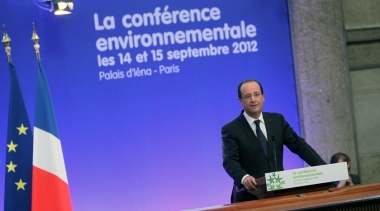France's oldest operating nuclear power plant will be forced to close in 2016, as president Francois Hollande sets the country on a path to reduce nuclear's share of generation from 75% to 50% by 2025.
 |
| Francois Hollande opens the conference (Image: Presidence de la Republique) |
Socialist Hollande was elected as the president of France in May, narrowly defeating the former Republican president Nicolas Sarkozy. Hollande had campaigned from a platform proposing a reduction in nuclear's share of the country's energy mix and pledging to order the closure of the two-unit Fessenheim plant before the end of his first term in 2017.
Speaking at a two-day environmental conference in Paris, Hollande confirmed that Fessenheim will close "at the end of 2016", provided that provisions are in place to ensure a secure electricity supply for the region and to safeguard employment. The president pledged that the site would become an "example" to the world of French decommissioning expertise.
Fessenheim is located in the Alsace region of north-eastern France, close to the borders with both Germany (less than 2km away) and Switzerland. The first of the plant's two 880 MWe pressurized water reactors entered commercial service in 1977, followed several months later by the second unit in early 1978. A review by French nuclear regulators in 2011 approved its suitability to operate for a further ten years subject to the completion of several measures including strengthening the unit's concrete basemat.
France currently relies on nuclear energy for 75% of its electricity, under a long-standing policy to ensure the country's energy security drawn up following the first oil crisis in the early 1970s. In his speech, Hollande reiterated his election promise to cap nuclear's share at 50% by 2025, and said he "regretted" the delay in French diversification into renewable energy, promising a strategy based on energy efficiency and renewable energy to effect an energy transition in France.
As the 1760 MWe of capacity at Fessenheim reaches its closure date in 2016 France's newest nuclear unit, the 1750 MWe EPR currently under construction at Flamanville, will be due to enter service. Prior to his election Hollande agreed to the completion of the Flamanville 3 EPR and indicated that he would not prevent the construction of another 1750 MWe EPR at Penly.
Researched and written
by World Nuclear News




_87299.jpg)
_52351.jpg)








